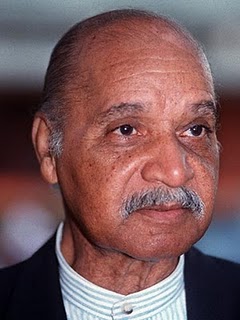José Craveirinha
| José Craveirinha | |
|---|---|
 |
|
| Born |
May 28, 1922 Maputo, Mozambique (then Lourenço Marques, Portuguese Mozambique) |
| Died | February 6, 2003 (aged 80) Johannesburg, South Africa |
| Pen name | Mário Vieira, José Cravo, Jesuíno Cravo, J. Cravo, J.C., Abílio Cossa, José G. Vetrinha |
| Occupation | Writer |
| Nationality | Mozambican |
| Genre | Poetry |
José Craveirinha (28 May 1922 - 6 February 2003) was a Mozambican journalist, story writer and poet, who is today considered the greatest poet of Mozambique. His poems, written in Portuguese, address such issues as racism and the Portuguese colonial domination of Mozambique. A supporter of the anti-Portuguese group FRELIMO during the colonial wars, he was imprisoned in the 1960s. He was one of the African pioneers of the Négritude movement, and published six books of poetry between 1964 and 1997. Craveirinha also wrote under the pseudonyms Mário Vieira, José Cravo, Jesuíno Cravo, J. Cravo, J.C., Abílio Cossa, and José G. Vetrinha.
Born in Maputo, Mozambique (then Lourenço Marques, Portuguese Mozambique), the child of a Portuguese father and a black mother of the Ronga ethnicity, Craveirinha was raised in the language and culture of Portugal.
As a journalist, he contributed to numerous Mozambican magazines and newspapers, including O Brado Africano (1918–74), Notícias, Tribuna, Notícias da Tarde, Voz de Moçambique, Notícias da Beira, Diário de Moçambique, and Voz Africana. He became familiar with other poets of the period through his journalism, notably Rui de Noronha (1909–1943), Marcelino dos Santos (1929– ), and Noemia de Sousa (1926–2003). His works were primarily political in nature. Consistent themes in his work were African self-determination, images of the African landscape, and writing that reflected the influence of African languages.
Craveirinha began his political activity at the Lourenço Marques African Association in the 1950s, an organization tolerated by the colonial Portuguese government, and later became its chairperson. He became involved in clandestine politics in this period, and became a member of a cell of FRELIMO, the leading movement for the liberation of Mozambique from Portuguese rule. He was imprisoned in solitary confinement by the fascist Portuguese PIDE régime in 1965, a year after his publication of his first collection of poetry, Chigubo. He was released from prison in 1969.
...
Wikipedia
